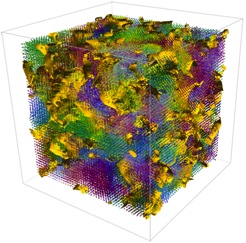
SDSC Cloud Selected as Data Archival Site for IEEE SciVis Contest
By:
- Jan Zverina
Published Date
By:
- Jan Zverina
Share This:
Article Content

2012 IEEE SciVis Winner: “Key Moments of the Evolution of the Polarization Domains in Barium Titanate.” Credits: Katrin Scharnowski, Michael Krone, Filip Sadlo, Philipp Beck, University of Stuttgart, Germany. Watch Video
The San Diego Supercomputer Center (SDSC) at the University of California, San Diego, has been selected as the archival host site for the Institute of Electrical and Electronics Engineers’ (IEEE) annual SciVis contest, which poses challenging research problems in science and engineering to the scientific visualization community.
Under the five-year agreement, SDSC will archive the visualizations in the SDSC Cloud, believed to be the largest academic-based cloud storage system in the U.S. The SDSC Cloud is specifically designed for researchers, students, academics, and industry users who require stable, secure, and cost-effective storage and sharing of digital information, including extremely large data sets.
Kitware Inc. has committed to mirror the data on SDSC Cloud through the Midas platform. All SciVis contests since 2004 have been consolidated under one website.
“We are delighted to provide archiving services via the SDSC Cloud for this annual contest, which is designed to help develop novel ways in which data can be analyzed using advanced visualization tools and techniques,” said SDSC Director Michael Norman.
The contest’s data archive has become a test bed for applying newly developed techniques on a wide range of easily available and open reference data sets with well-defined problems.
“It’s important to encourage open accessibility and diversity of datasets, as well as the visualization and analysis of larger scale data that is becoming more and more common throughout the scientific community,” said Amit Chourasia, a senior visualization scientist with SDSC and former chair of the SciVis contest, who helped facilitate the archiving project using the SDSC Cloud. “Now we can curate many of the challenging and open reference datasets where newer techniques can be demonstrated and compared with existing ones.”
Formerly called the Vis Contest, the SciVis competition focuses on a different field of science each year. Contestants are provided a set of scientific questions and underlying data, and then tasked with developing new ways to analyze the data using visualization techniques.
This year’s winners, recently announced, were Katrin Scharnowski, Michael Krone, Filip Sadlo, and Philipp Beck, from the University of Stuttgart, Germany, for their entry called ‘Visualization of Polarization Domains in Barium Titanate.’ The winners will present their work at the VisWeek conference October 14-19, 2012, in Seattle, Washington.
Dr. Stepano Leoni, Max Planck Institute Chemical Physics of Solids, Dresden, Germany, provided the data and problems for this year’s contest. The contest chair was Gabriel Zachmann, University of Bremen, and the co-chair was Jean Favre, of the Swiss National Supercomputing Center.
“These contests have served a very important role to stimulate the visualization community with new and challenging problem sets each year,” said Russell Taylor, SciVis conference chair for 2012 and a research professor at the University of North Carolina (UNC) at Chapel Hill. “The contest not only provides a new challenge to established researchers, but also to students who are getting their feet wet in visualization.”
A new SciVis contest for 2013 will be formally announced at the 2012 VisWeek conference with a problem focus on brain imaging. The contest is open to all.
Share This:
You May Also Like
Stay in the Know
Keep up with all the latest from UC San Diego. Subscribe to the newsletter today.


